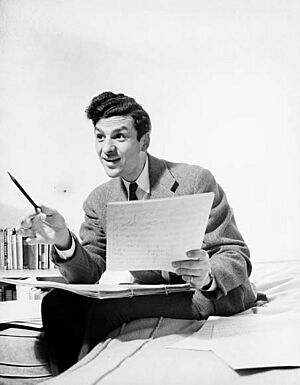Louis Applebaum facts for kids
Quick facts for kids
Louis Applebaum
CC OOnt
|
|
|---|---|

Applebaum in December 1945
|
|
| Born | April 3, 1918 |
| Died | April 19, 2000 (aged 82) Toronto, Ontario, Canada
|
| Known for | Composer, administrator, conductor |
| Awards | Order of Canada Order of Ontario |
Louis Applebaum (April 3, 1918 – April 19, 2000) was a talented Canadian composer. He wrote music for movies, managed arts organizations, and led orchestras. He is best known for his many film scores.
Contents
Early Life and Music Studies
Louis Applebaum was born in Toronto, Ontario, Canada. He loved music from a young age. He studied at the Toronto Conservatory of Music. He also attended the University of Toronto. There, he learned from famous musicians like Healey Willan and Ernest MacMillan. He even took private lessons in New York to improve his skills.
Composing for Films
Louis Applebaum wrote music for about 250 films! Most of these were for the National Film Board of Canada (NFB). He worked there from 1942 to 1960. For six years, he was the NFB's music director. He helped decide what music went into their films.
Some of the movies he scored include Royal Journey (1951) and The Stratford Adventure (1954). He also wrote music for Paddle to the Sea (1966).
Awards for Film Music
Louis Applebaum's music was so good that he won many awards.
- He was nominated for an Academy Award (also known as an Oscar) in 1945. This was for the music in the war film The Story of G.I. Joe. He shared this nomination with another composer, Ann Ronell.
- In 1968, he won a Canadian Film Award for his music in the film Athabasca.
- He won a Gemini Award in 1989. This award was for the best original music score for a TV show or mini-series called Glory Enough for All.
Working with the Stratford Festival
Louis Applebaum was very important to the Stratford Festival. This is a famous theatre festival in Canada.
- He was the first music director for the festival.
- In 1955, he helped start the Stratford Music Festival. This was a new music event that grew from the theatre festival.
- He wrote music for 70 different plays and productions over 46 years.
- His special fanfares (short, loud pieces of music) have been played before every show at Stratford's main stage since 1953.
Other Important Roles
After leaving his main role at Stratford in 1960, Louis Applebaum continued to work in many areas of Canadian arts.
- He was president of a company called Group Four Productions. They made documentaries and TV shows.
- He advised CBC Television on music.
- He helped create the National Arts Centre Orchestra. This is a well-known orchestra in Canada.
- He led committees that promoted Canadian music.
- He was the executive director of the Ontario Arts Council from 1971 to 1980. This council helps support artists and arts organizations in Ontario.
The Applebaum-Hébert Report
One of his most important contributions was co-writing the Applebaum-Hébert Report. This report looked at how the Canadian government supported arts and culture. It was a big study that helped shape cultural policies in Canada.
Honours and Legacy
Louis Applebaum received many honours for his work.
- In 1976, he was made an Officer of the Order of Canada. This is one of the highest awards a Canadian can receive.
- He was appointed to the Order of Ontario in 1989.
- In 1995, he became a Companion of the Order of Canada, an even higher honour.
- In 1997, he received a special award at the SOCAN Awards for his achievements.
To honour his legacy, the Ontario Arts Foundation created the Louis Applebaum Composers Award in 1998. This award celebrates excellent music composition for film and television.
 | Ernest Everett Just |
 | Mary Jackson |
 | Emmett Chappelle |
 | Marie Maynard Daly |

